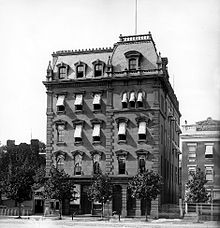
The Freedman's Saving and Trust Company, known as the Freedman's Savings Bank, was a private savings bank chartered by the U.S. Congress on March 3, 1865, to collect deposits from the newly emancipated communities. The bank opened 37 branches across 17 states and Washington DC within 7 years and collected funds from over 67,000 depositors.[1] At the height of its success, the Freedman's Savings Bank held assets worth more than $3.7 million in 1872 dollars, which translates to approximately $80 million in 2021.[2][3]
However, the rapid development of the bank was largely driven by false claims and was coupled with mismanagement and fraud.[4] The bank failed in 1874, weighed down by speculative loans issued by the bank's white officials throughout its existence.[2][5]: 138 Historians believe that the bank's failure not only destroyed the savings of many African Americans, but also their trust in financial institutions.[5]: 211 [6][7]
The site where the bank's headquarters once stood was later occupied by the Treasury Annex. The Annex was renamed the Freedman's Bank Building in 2016.
- ^ "United States, Freedman's Bank Records, 1865-1874 — FamilySearch.org". www.familysearch.org. Retrieved 2021-04-08.
- ^ a b Bruce. "S. Rept. 46-440 - In the Senate of the United States. April 2, 1880. Ordered to be printed. Mr. Bruce, from the Select Committee on the Freedman's Savings and Trust Company, submitted the following report. (To accompany Bills S. 711 and S. 1581.) ." GovInfo.gov. U.S. Government Printing Office. Retrieved 19 June 2023.
- ^ Cite error: The named reference
BHMwas invoked but never defined (see the help page). - ^ "Finance, Advertising and Fraud: The Rise and Fall of the Freedman's Savings Bank" (PDF).
- ^ a b Osthaus, Carl (1976). Freedmen, Philanthropy, and Fraud: A History of the Freedman's Savings Bank.
- ^ Baradaran, Mehrsa (2017). The Color of Money: Black Banks and the Racial Wealth Gap.
- ^ Levy, Jonathan. Freaks of Fortune: The Emerging World of Capitalism and Risk in America.